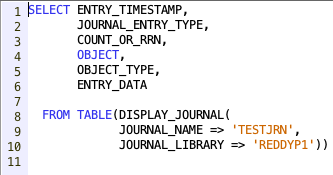Working with XML in RPGLE : XML-SAX
Working with XML in RPGLE : XML-SAX
Working with XML has never been easier before IBM's introduction of XML-INTO and XML-SAX compatibility to RPGLE.
My earlier post did contain detailed info about basics on XML with RPGLE and compatibility of XML-INTO with RPGLE along with its own advantages and disadvantages. If you haven't gone through them yet, Click on those links to have quick look.
XML-SAX:
Even though XML-INTO provides the greatest comfort to programmers by directly bringing the data to Respective variable/data structure. But, this doesn't help programmers when the XML elements/data has been inconsistent.
XML-SAX is the best way of handling such XMLs. This will read the XML character by character and calls Handling Procedure when the even gets triggered.
Syntax:
Xml-Sax(e) %Handler(XMLHandler_Procedure : CommsArea_DataStructure ) %XML(wXmlString: 'doc=string')
Below are some possible events that can occur while parsing XML.
This has been split by the phase those events can occur along with its description to understand better.
Events discovered before the first XML element:
- *XML_START_DOCUMENT - Indicates that parsing has begun
- *XML_VERSION_INFO - The "version" value from the XML declaration
- *XML_ENCODING_DECL - The "encoding" value from the XML declaration
- *XML_STANDALONE_DECL - The "standalone" value from the XML declaration
- *XML_DOCTYPE_DECL - The value of the Document Type Declaration
Events related to XML elements
- *XML_START_ELEMENT- The name of the XML element that is starting
- *XML_CHARS - The value of the XML element
- *XML_PREDEF_REF - The value of a predefined reference
- *XML_UCS2_REF - The value of a UCS-2 reference
- *XML_UNKNOWN_REF - The name of an unknown entity reference
- *XML_END_ELEMENT - The name of the XML element that is ending
Events related to XML attributes
- *XML_ATTR_NAME - The name of the attribute
- *XML_ATTR_CHARS - The value of the attribute
- *XML_ATTR_PREDEF_REF - The value of a predefined reference
- *XML_ATTR_UCS2_REF - The value of a UCS-2 reference
- *XML_UNKNOWN_ATTR_REF - The name of an unknown entity reference
- *XML_END_ATTR - Indicates the end of the attribute
Events related to XML processing instructions
- *XML_PI_TARGET - The name of the target
- *XML_PI_DATA - The value of the data
Events related to XML CDATA sections
- *XML_START_CDATA - The beginning of the CDATA section
- *XML_CHARS - The value of the CDATA section
- *XML_END_CDATA - The end of the CDATA section
Other events
- *XML_COMMENT - The value of the XML comment
- *XML_EXCEPTION - Indicates that the parser discovered an error
- *XML_END_DOCUMENT - Indicates that parsing has ended
Below example will show on how to use some of the basic events that usually occur.
E.g.:
H DftActGrp(*No)
// Standalone Variables Declaration
D wSampleXml S 512A
D wXmlOptions S 512A Varying
D SaveElement S 50A
// Data Structure for Communication Area
D DsCommunicationArea...
D DS
D AttrName 20A Varying
D HaveAttr N
D AttrValue 20A Varying
D DsCommArea DS LikeDs(DsCommunicationArea)
// Handling Procedure Prototype
D pHandlingProcedure...
D PR 10I 0
D pCommArea LikeDs(DsCommunicationArea)
D pEvent 10I 0 Value
D pString * Value
D pStringLen 20I 0 Value
D pExceptionId 10I 0 Value
/Free
wSampleXml = '<Order>'
+ '<Type>Weborder</Type>'
+ '<Number>123456789</Number>'
+ '<Customer>Mr. John</Customer>'
+ '<Status>Despatched</Status>'
+ '</Order>' ;
wSampleXml = %Xlate(x'3f' : x'40' : wSampleXml) ;
wXmlOptions = 'doc=string ';
Xml-Sax(E) %Handler(pHandlingProcedure : DsCommArea)
%Xml(wSampleXml : wXmlOptions) ;
If %Error() ;
Dsply 'Error Occured While Parsing XML. Please Review.' ;
EndIf ;
*InLr = *On ;
/End-Free
// Handling Procedure for XML-SAX
P pHandlingProcedure...
P B
D pHandlingProcedure...
D PI 10I 0
D pCommArea LikeDs(DsCommunicationArea)
D pEvent 10I 0 Value
D pString * Value
D pStringLen 20I 0 Value
D pExceptionId 10I 0 Value
// Work Variables Declaration
D wReturnValue S 10I 0 Inz(0)
D Value S 65535A Based(pString)
/Free
Select ;
When pEvent = *XML_START_DOCUMENT ;
pCommArea.HaveAttr = *Off ;
Dsply 'Initialize Local Variables. If any' ;
When pEvent = *XML_START_ELEMENT ;
SaveElement = %Subst(Value:1:pStringLen);
Dsply SaveElement ;
When pEvent = *XML_CHARS ;
SaveElement = %Subst(Value:1:pStringLen);
Dsply SaveElement ;
When pEvent = *XML_END_ELEMENT ;
SaveElement = %Subst(Value:1:pStringLen);
Dsply SaveElement ;
When pEvent = *XML_ATTR_NAME ;
pCommArea.AttrName = %Subst(Value:1:pStringLen);
Dsply pCommArea.AttrName ;
When pEvent = *XML_ATTR_CHARS ;
pCommArea.AttrValue = %Subst(Value:1:pStringLen);
Dsply pCommArea.AttrValue ;
When pEvent = *XML_END_ATTR ;
pCommArea.AttrName = %Subst(Value:1:pStringLen);
Dsply pCommArea.AttrName ;
When pEvent = *XML_END_DOCUMENT ;
wReturnValue = -1 ;
Dsply 'No Further Parsing is Needed' ;
EndSl ;
Return wReturnValue ;
/End-Free
P pHandlingProcedure...
P E
In this example, we are storing XML data into Variable and using Option 'doc=string'.
If the XML has been stored on IFS path. Same program can be considered as an example by just simple change.
- Initialize the wSampleXml with IFS path.
- Remove the XML Population into wSampleXml variable.
- Use 'doc=file' in XML options.
You can try on by replacing 'Dsply' Statements with actual requirement.

Comments
Post a Comment